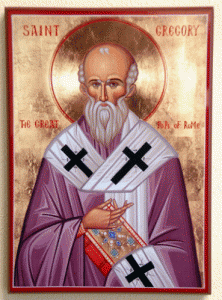 It is a long-held Eastern tradition that the Divine Liturgy is not celebrated during the weekdays of the Great Fast. Why? Because the celebratory nature of the Divine Liturgy conflicts with the idea of fasting. However the Church, in order support the faithful in their Lenten effort, designate that the fast can be broken on Wednesdays and Fridays by the reception of Holy Communion. Our Church sees Holy Communion as spiritual food given to us by God to nourish our souls and help us in our efforts at becoming His children.
It is a long-held Eastern tradition that the Divine Liturgy is not celebrated during the weekdays of the Great Fast. Why? Because the celebratory nature of the Divine Liturgy conflicts with the idea of fasting. However the Church, in order support the faithful in their Lenten effort, designate that the fast can be broken on Wednesdays and Fridays by the reception of Holy Communion. Our Church sees Holy Communion as spiritual food given to us by God to nourish our souls and help us in our efforts at becoming His children.
The Liturgy is a very ancient one. This Liturgy was first documented by St. Gregory the Dialogist (AD 540-604), who was the papal legate to Constantinople. At one time it was supposed that he had come up with the idea himself, but now it is generally supposed that he simply recorded what was otherwise being practiced at Constantinople. He is still commemorated as its traditional author.
This Liturgy is also mentioned in the Canons of the 7th century Quinisext Council, obviously indicating that it was in use at a much earlier date. We read this: On all days of the holy fast of Lent, except on the Sabbath, the Lord’s Day, and the feast of the Annunciation, the Liturgy of the Presanctified is to be served (Canon 52, Quinisext, 692).
The Liturgy is an evening service. It is the solemn lenten Vespers with the administration of Holy Communion added to it. During this service there is no consecration of the gifts of bread and wine. The Holy Communion given from gifts sanctified on the previous weekend. It derives its name from the fact that the gifts are presanctified.
During the weeks of the Great Fast, Old Testament readings are traditionally used from Genesis and Proverbs. During Great and Holy Week a Gospel reading is added. The Old Testament is used to set the stage for us to think of the 40 days of the Fast as a reliving of the 40 years of Israel in the desert and to begin to see Jesus Christ as the New Moses. These readings also remind us that Jesus is the same Yahweh who led Israel out of bondage to freedom. These readings remind us of Exodus of Israel from captivity. The book of Proverbs reminds us that our covenant with God is a covenant which suggests a “way of living.” A close listening to Proverbs reminds us that the way to establish a union with God is by living in a certain way. They convey common sense living.
